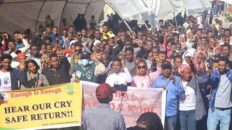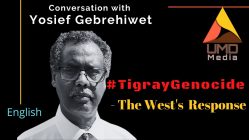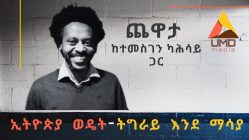Personal call
The current situation in Tigray – oscillating between states of hope and desperation, optimism and pessimism, and post-war opportunities and crises – presents ‘strategic dilemmas’ that need well thought-out and crafted interventions to determine the future course of events; interventions that need to be implemented with thoughtful introspection, absolute responsibility, and flexibility. Future generations will look back on this moment and reflect critically on how these dilemmas were addressed. Our choices and actions today will be judged by our children, and by history.
1. Of all lessons, the primary lesson that Tigrayans should take on board from the events of the last two years is that no person or party, no Ethiopian federal system, no Pan-African mechanism, and no international body will save a community from the most atrocious of all crimes and wars. It has been a rude awakening for everyone – and at these most painful times for the people of Tigray, it would be inexcusable if Tigrayan political forces failed to accommodate one another and disregarded the fundamental human and democratic rights that are critical to Tigray’s survival.
2. Unprecedented genocidal war calls for exceptional responsibility and imposes a duty to protect civilians and facilitate and mobilize all resources to create peace and development for people on the ground. Such extraordinary responsibilities are beyond the capabilities of a single president, government, political party or even a particular generation – it is a task for multiple generations, including those to come. In the catastrophic condition Tigray is in today, the primary focus of governance should be the survival and best interests of current and future generations of Tigrayans, not power politics.
3. All Tigrayans need to take responsibility for one another. All of us have an extraordinary obligation to protect the people of Tigray from the possible recurrence of genocidal war, and to rebuild Tigray. These duties cannot be left to a few government officials, generals, scholars, and associations – and certainly not to politicians and their political parties.
4. As a political community, through the transitional process that will be embarked on soon, Tigrayan powers must lay down a firm foundation for a democratic, resilient, and prosperous future for the people of Tigray. The importance of inclusive governance and the protection of fundamental human and democratic rights in Tigray cannot be overstated. This is significant not only because of the continued siege and the ongoing crimes of atrocity in many parts of the occupied territories of Tigray, but also because the Pretoria deal and its subsequent Nairobi declarations have not addressed the root causes of the war. It is imperative to prevent the recurrence of a genocidal war, and this calls for a Tigray equipped with vibrant and inclusive democratic governance – as elsewhere in the world where people are facing similar existential threats.
5. It is completely in order to express the sincerest respect to the people of Tigray, and immense gratitude to members of the Tigray Defense Forces (TDF) for their sacrifice. We should continue to offer concrete support to TDF members and the families of those who paid for the war with their invaluable life and limbs. However, the sacrifices of the people of Tigray will ultimately only hold meaning if they lead to sustainable and resilient peace, security, democracy and prosperity for Tigray, the wider region, and future generations of Tigrayans.
6. Thus, we all need to embark on a transition that will transform and democratize politics in Tigray and realize the aspirations of Tigrayans. It is critical for all Tigrayans – both at home and in the diaspora – to be vigilant, and to endeavor to install political and legal accountability mechanisms and a meritocratic system that will prevent Tigray from repeating the same maladies that arise from authoritarian regimes in Ethiopia and other neighboring countries.
7. At the core of legitimate, viable and capable governance lies the people’s right to participate in public affairs; directly or through freely chosen representatives who exercise political power; in particular through those offices that hold legislative and executive powers. Such participation in public affairs includes people exerting influence through public debate and dialogue among themselves, and with their representatives. This participation is only supported if freedom of expression, assembly and association are guaranteed. Freedom of information and expression, assembly and association are essential for effectively exercising the right to public participation. It is essential that Tigrayan authorities respect and protect these rights.
8. I call on all parties and personalities to re-engage with each other, take tangible actions towards building a democratic culture of pluralism, and ensure that all public deliberations and actions are transparent, accountable and in accordance with the rule of law, the Constitution, and international human rights.
I further urge Tigrayan forces and political parties to issue a joint code of conduct, publicly expressing their commitment to legitimate, responsive, and democratic governance, the protection of human rights, and the renunciation of inflammatory rhetoric and use of violence in their public engagements.




